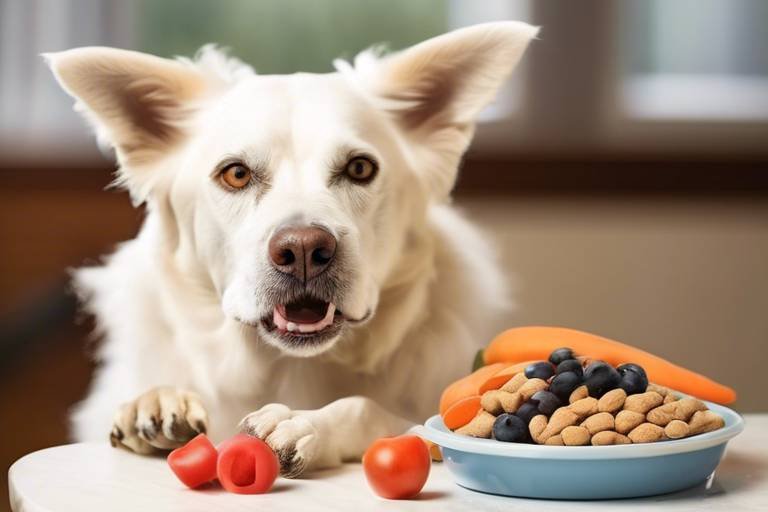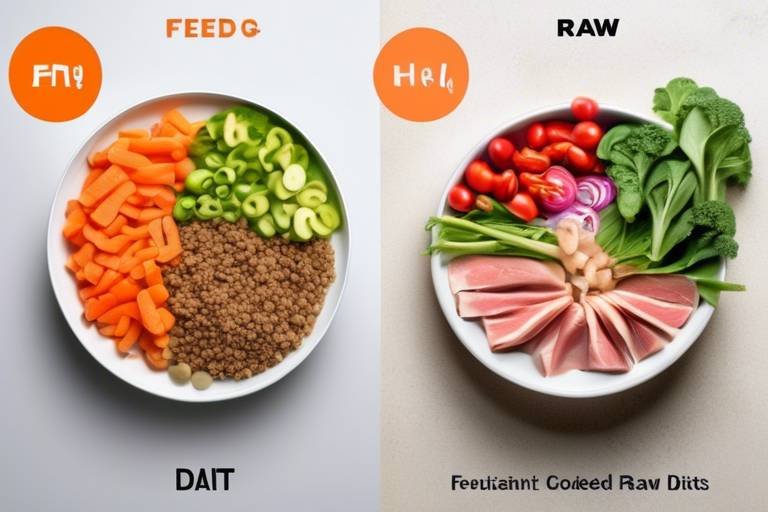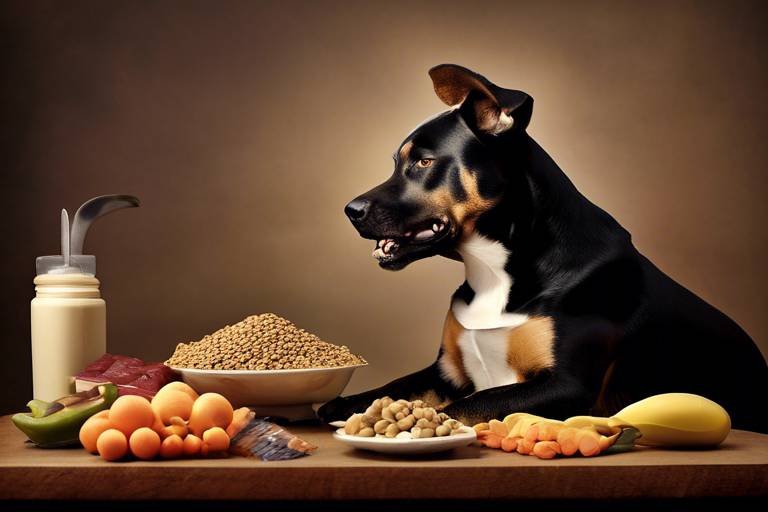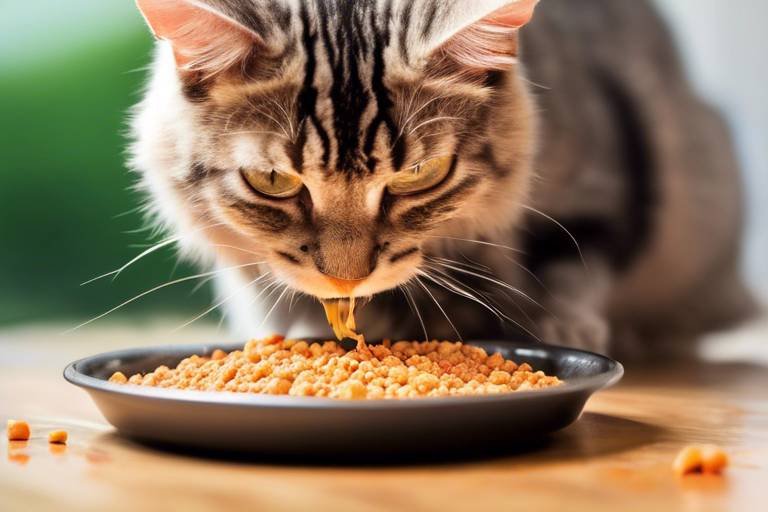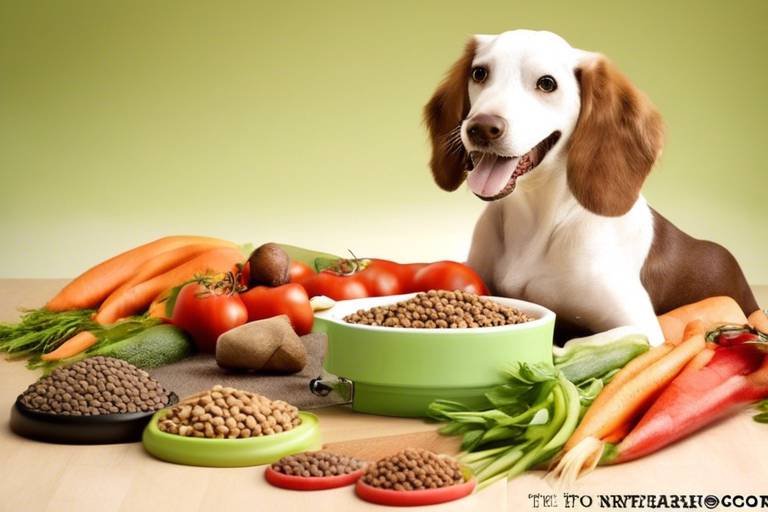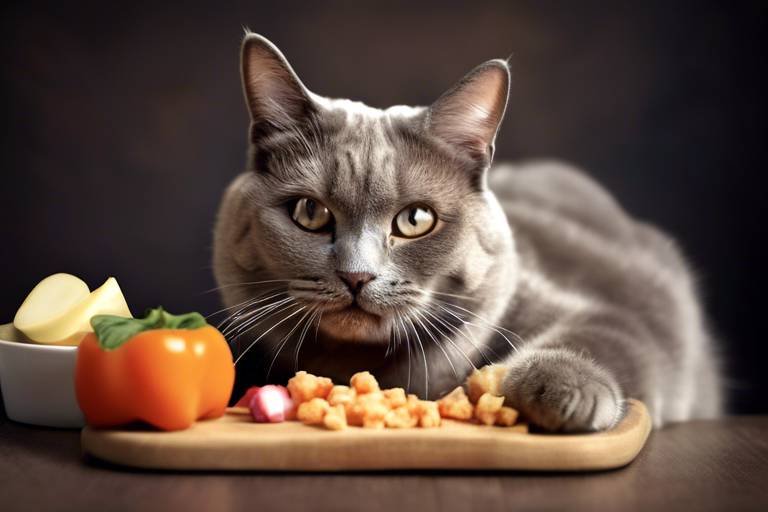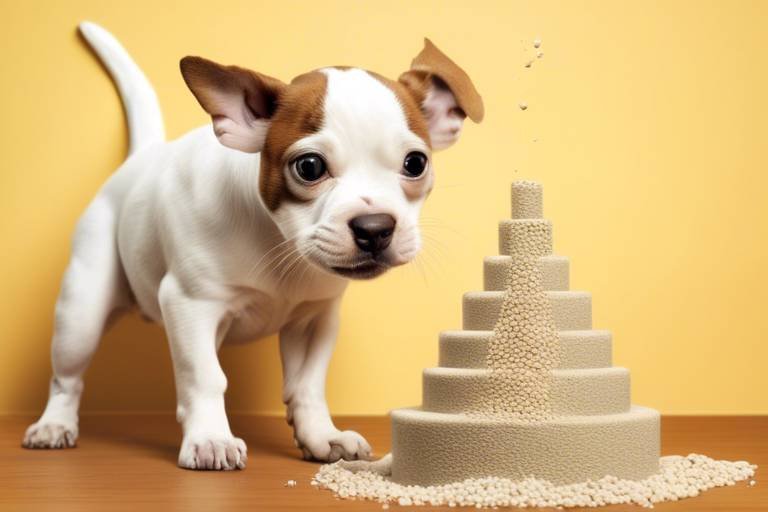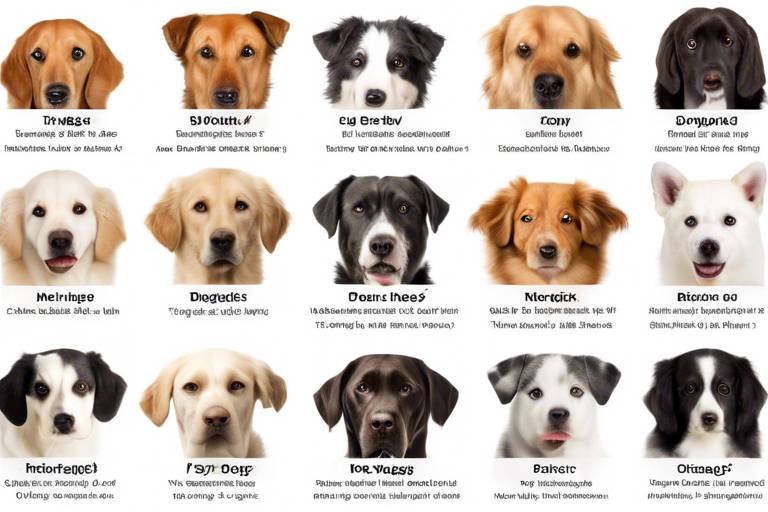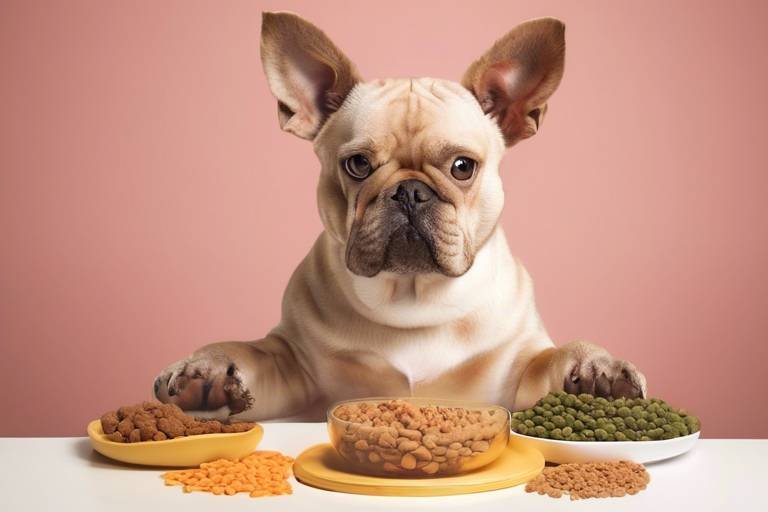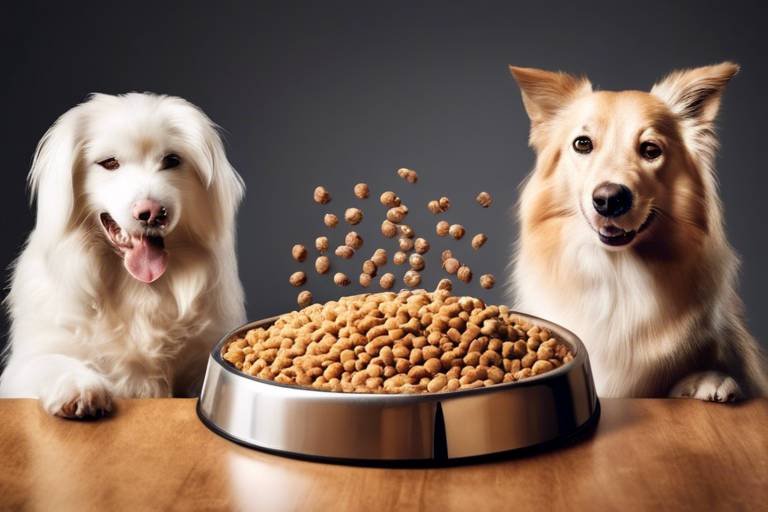Tips for Feeding Your Pet During Special Occasions
Special occasions are a time for celebration, joy, and togetherness. But let’s not forget about our furry friends who love to be part of the festivities! Just like us, pets enjoy the extra attention and treats that come with special events. However, it’s essential to keep their health and well-being in mind while including them in the fun. So, how can we ensure our pets enjoy these moments without compromising their health? Let’s dive into some valuable tips that will help you navigate the world of pet feeding during celebrations.
First and foremost, understanding your pet's unique dietary needs is crucial. Every pet is different, and what works for one might not work for another. For instance, dogs and cats have different nutritional requirements, and even within those categories, individual breeds may have specific needs. This means that you should always be aware of what your pet can and cannot eat. During special occasions, many of us tend to indulge a little more, but it’s vital to remember that our pets should not be treated the same way. Instead, think of their dietary needs as a roadmap to ensure they stay healthy and happy.
Now, let’s talk about safe treats. Not all human foods are safe for our pets, and some can even be harmful. It’s essential to research and identify which treats can be safely offered during celebrations. For instance, fruits like apples and blueberries can make excellent, healthy snacks for dogs, while cats might enjoy small bits of cooked chicken or turkey. Always remember to avoid foods that are toxic to pets, such as chocolate, onions, and grapes. To make it easier, here’s a quick reference table of safe and unsafe treats:
| Safe Treats | Unsafe Treats |
|---|---|
| Carrots | Chocolate |
| Peanut Butter (unsweetened) | Onions |
| Plain Cooked Chicken | Grapes |
| Apples (without seeds) | Avocado |
Creating homemade treats is another fantastic way to celebrate. Not only can you control the ingredients, but you can also cater to your pet's preferences. Imagine whipping up some pumpkin-flavored biscuits for your dog or a tuna cake for your cat! These homemade delights can be both nutritious and festive, making your pet feel special. Plus, there’s something heartwarming about preparing a treat with your own hands. If you’d like to try your hand at some recipes, just let your creativity flow! Just keep in mind the ingredients to avoid, such as chocolate or anything with artificial sweeteners.
Even when you’re treating your pet, moderation is key. Just like we can overindulge during the holidays, our pets can too. Understanding portion control is essential to prevent them from experiencing tummy troubles. Think of treats as the icing on the cake; they should enhance the experience, not overwhelm it. A good rule of thumb is to limit treats to no more than 10% of your pet's daily caloric intake. This way, you can ensure your pet enjoys the festivities without feeling sick afterward!
Involving your pet in celebrations is not just about food; it’s about making them feel loved and included. Consider planning activities that allow your furry friend to participate. For example, you could set up a pet-friendly photo booth or have a small gathering where pets are welcome. This ensures that your pet feels like part of the family during these special moments. After all, what’s a celebration without our loyal companions by our side?
Lastly, planning ahead for special meals is vital. Preparation is key when it comes to ensuring your pet enjoys a delightful meal during celebrations. Think about what you want to serve and prepare it in advance. This way, you can focus on enjoying the occasion without worrying about what your pet will eat. And if you’re ever in doubt about introducing new foods or treats, don’t hesitate to consult your veterinarian. They can provide valuable insights and help you make informed decisions about your pet’s diet during special occasions.
- Can I give my pet table scraps during celebrations? It's best to avoid table scraps, as many human foods can be unhealthy or toxic for pets. Stick to safe treats!
- What should I do if my pet eats something harmful? If you suspect your pet has consumed something toxic, contact your veterinarian immediately.
- How can I make my pet feel included in the celebration? Plan pet-friendly activities, give them special treats, and make sure they are part of the family fun!
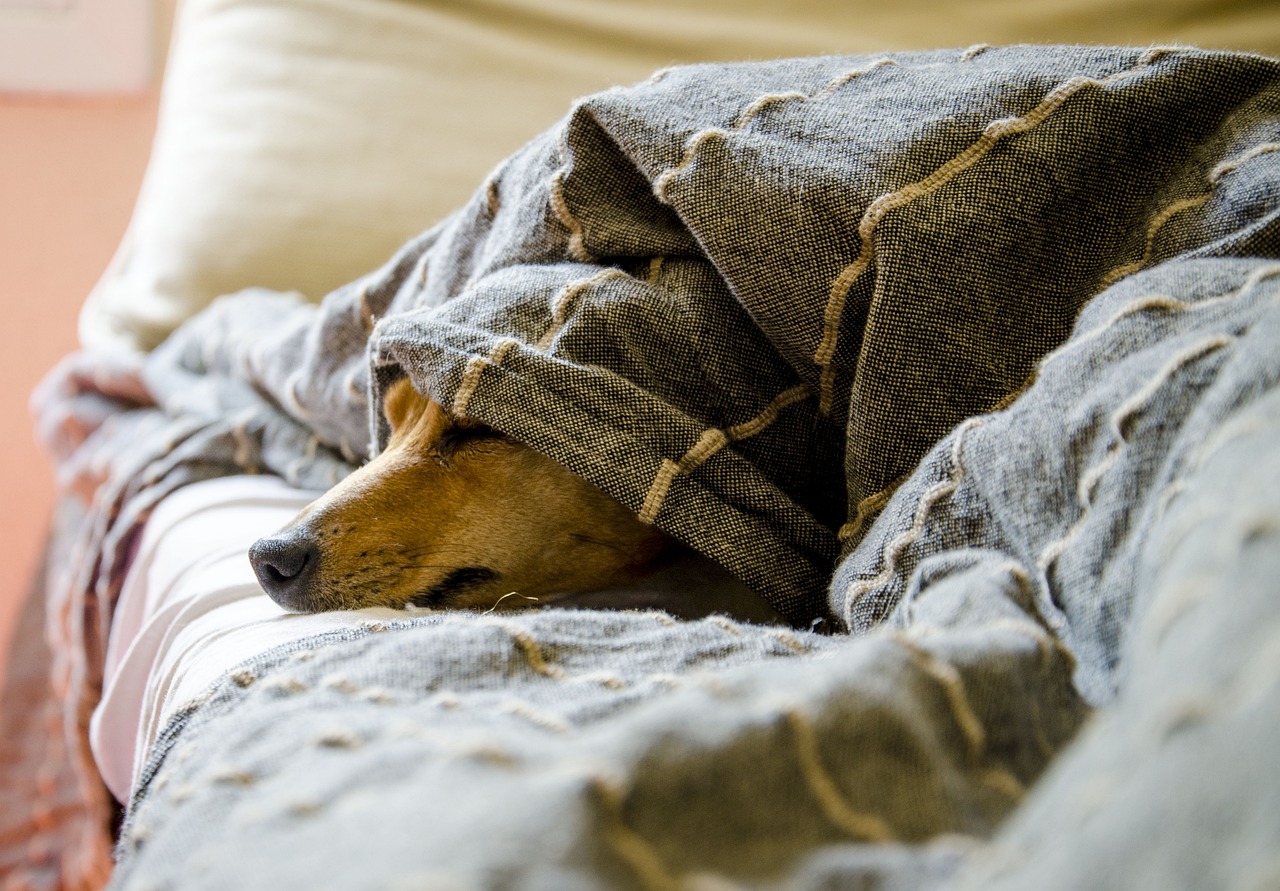
Understanding Your Pet's Dietary Needs
Every pet is unique, much like snowflakes in a winter storm. They each have their own dietary requirements that cater to their specific health, age, and breed. Understanding these needs is crucial, especially during special occasions when our furry friends might be tempted with treats that could disrupt their well-being. Just like humans, pets have different nutritional requirements, and what might be a delightful snack for one could be harmful to another. For instance, while some dogs can handle a bit of dairy, others may experience digestive issues. Therefore, getting to know your pet's specific needs is the first step in ensuring they enjoy special occasions safely.
When considering your pet's diet, think about their age, activity level, and health status. Puppies and kittens require more calories and nutrients to support their growth, while older pets often need a diet lower in calories but higher in fiber to maintain a healthy weight. Moreover, pets that are more active may need additional protein to fuel their energy levels. It's essential to consult with your veterinarian to create a tailored diet plan that suits your pet's individual needs.
Additionally, keep in mind that certain pets may have allergies or sensitivities to specific ingredients. For example, some dogs are allergic to grains, while others may react negatively to chicken or beef. To help you navigate this, here’s a simple breakdown of common dietary needs:
| Pet Type | Age Group | Dietary Focus |
|---|---|---|
| Dog | Puppy | High protein, calcium for growth |
| Dog | Adult | Balanced nutrition, weight management |
| Dog | Senior | Low calories, high fiber |
| Cat | Kitten | High protein, taurine for development |
| Cat | Adult | Balanced nutrition, hydration |
| Cat | Senior | Low calories, joint health |
Understanding your pet's dietary needs not only helps in maintaining their health but also enhances their overall quality of life. It's similar to how we feel energized and happy when we eat well; our pets thrive on a balanced diet too! So, during those festive moments, be sure to keep their dietary requirements in mind, ensuring they can join in the fun without compromising their health.

Safe Treats for Special Occasions
When it comes to celebrating special occasions with our beloved pets, it's essential to ensure that the treats we offer them are not only delicious but also safe. After all, who doesn't love to indulge their furry friends during festive times? However, it's crucial to remember that not all human foods are suitable for pets. In fact, some can even be harmful. So, how do we strike the perfect balance between celebration and safety? Let's dive into the world of pet-friendly treats that will keep tails wagging and hearts happy!
First off, consider natural options that you can find in your kitchen. Fruits and vegetables can be a fantastic choice for your pet's special treat. For instance, carrots, green beans, and sweet potatoes are not only safe but also nutritious. Plus, they can be served raw or cooked, making them versatile for any occasion. Just remember to cut them into bite-sized pieces to avoid any choking hazards!
Another great option is lean meats. Cooked chicken, turkey, or even fish can make a delightful snack for your pet. Just ensure that these meats are plain, without any seasoning, sauces, or bones, as these can pose serious health risks. You can even make a fun game out of it by hiding small pieces of meat around the house for your pet to find—talk about a delicious treasure hunt!
Now, let’s talk about commercial treats. There are plenty of pet-specific treats available in stores that are designed for special occasions. When choosing these, always check the labels for any harmful ingredients. Look for treats that list whole foods as the primary ingredients and avoid those with artificial additives. Brands that focus on natural ingredients are often your best bet.
To give you a clearer picture, here’s a quick comparison of some safe and unsafe treat options for your pet:
| Treat Type | Safe Options | Unsafe Options |
|---|---|---|
| Fruits | Apples, Bananas, Blueberries | Grapes, Cherries, Avocado |
| Vegetables | Carrots, Peas, Sweet Potatoes | Onions, Garlic, Mushrooms |
| Meats | Cooked Chicken, Turkey, Fish | Processed Meats (like bacon), Raw Meat |
Remember, it's not just about what you give your pet; it's also about how much. Even safe treats can lead to health issues if given in excess. Portion control is key! Treats should only make up a small part of your pet's daily diet. A good rule of thumb is to limit treats to about 10% of their daily caloric intake. This way, your furry friend can enjoy their special snacks without compromising their health.
In conclusion, special occasions are a wonderful opportunity to bond with your pet and show them how much you care. By choosing safe, nutritious treats and practicing moderation, you can ensure that your celebrations are not only joyful but also healthy for your beloved companion. So, get ready to celebrate and make some tail-wagging memories!
Q: Can I give my pet cake on their birthday?
A: While traditional cake is not suitable for pets, you can make a pet-friendly cake using safe ingredients like peanut butter, pumpkin, and oats. Just be sure to avoid sugar and chocolate!
Q: Are there any treats I should avoid completely?
A: Yes, some foods like chocolate, caffeine, alcohol, grapes, and onions are toxic to pets and should never be given under any circumstances.
Q: How can I tell if a treat is safe for my pet?
A: Always read the ingredient list. Look for treats with whole food ingredients and avoid those with artificial preservatives or additives. When in doubt, consult your veterinarian.
Homemade Treat Recipes
Creating homemade treats for your pet is not only a fun activity but also a fantastic way to ensure that your furry friend enjoys delicious snacks made with love. By preparing these treats yourself, you can control the ingredients and cater to your pet's specific tastes and dietary needs. Here are a couple of simple yet delightful recipes that will have your pet wagging their tail in excitement!
One popular recipe is the Peanut Butter and Banana Dog Biscuits. This treat is super easy to make and requires just a few ingredients:
| Ingredient | Amount |
|---|---|
| Whole wheat flour | 2 cups |
| Peanut butter (unsweetened) | 1/2 cup |
| Mashed banana | 1 |
| Water | 1/4 cup |
| Egg | 1 |
To prepare these delightful biscuits, simply mix all the ingredients in a bowl until a dough forms. Roll out the dough to about 1/4 inch thick, and use cookie cutters to create fun shapes. Bake the treats at 350°F (175°C) for about 20-25 minutes or until they are golden brown. Let them cool completely before serving them to your pet. Trust me, they will love these crunchy delights!
Another fantastic option is the Sweet Potato Chews. These are not only tasty but also packed with nutrients. All you need is a couple of sweet potatoes. Slice them into thin strips and bake them at 250°F (120°C) for about 3 hours. This slow baking process will dehydrate the sweet potatoes, turning them into chewy treats that your pet will adore. Just remember to let them cool before handing them over!
When making homemade treats, always keep your pet’s dietary restrictions in mind. It’s essential to avoid any ingredients that might be harmful. For instance, if your pet has allergies or sensitivities, you can easily adjust the recipes to accommodate them. The key is to keep it simple, wholesome, and fun!
Lastly, always store your homemade treats in an airtight container to keep them fresh. You can even label them with the date they were made to ensure they are consumed while still tasty. Homemade treats are a great way to celebrate special occasions with your pet, making them feel like a part of the festivities!
- Can I use regular flour instead of whole wheat flour? Yes, but whole wheat flour is generally healthier for pets.
- How long can I store homemade treats? Typically, they can last about a week in an airtight container, or longer if refrigerated.
- What if my pet has allergies? Always consult with your veterinarian before introducing new ingredients to your pet's diet.
Ingredients to Avoid
When it comes to treating your furry friend during special occasions, it's essential to know which ingredients can be harmful. Just like you wouldn’t want to eat something that could make you sick, the same goes for your pets. Certain foods that are safe for humans can be downright dangerous for our beloved companions. Here’s a quick rundown of some ingredients you should always avoid:
- Chocolate: This sweet treat is toxic to dogs and cats alike. It contains theobromine, which can cause heart issues, tremors, or even seizures.
- Onions and Garlic: These common kitchen staples can damage your pet’s red blood cells, leading to anemia.
- Grapes and Raisins: While they may be a healthy snack for humans, they can cause kidney failure in pets.
- Xylitol: This sugar substitute, often found in sugar-free gum and candies, can lead to a rapid drop in blood sugar and liver failure in dogs.
- Alcohol: Even small amounts can be dangerous, leading to vomiting, diarrhea, difficulty breathing, and even death.
It's not just about what you feed your pet; it’s also about what you don’t feed them. Many pet owners might not realize that foods like macadamia nuts, avocados, and certain spices can also pose risks. For instance, macadamia nuts can cause weakness and tremors in dogs, while avocados contain a substance called persin which can be harmful to pets.
Always remember, when in doubt, it’s better to stick to pet-safe treats or consult with your veterinarian before introducing any new foods into your pet’s diet. Your pet’s health and safety should always come first, especially during those festive occasions when it’s easy to get carried away with the celebrations!
By being aware of these harmful ingredients, you can ensure that your celebrations remain joyful and safe for your furry companions. It’s all about creating a happy environment where your pets can enjoy the festivities without any health risks.
Q: Can I give my pet table scraps during special occasions?
A: While some table scraps may be safe, many human foods can be harmful. Always check if a specific food is pet-friendly before sharing.
Q: What should I do if my pet accidentally eats something harmful?
A: Contact your veterinarian or an emergency animal poison control hotline immediately for guidance.
Q: Are there any safe alternatives to human food for pets during celebrations?
A: Yes! There are many pet-safe treats available, and you can also make homemade treats using safe ingredients.
Portion Control for Treats
When it comes to treating your furry friend during special occasions, portion control is an absolute must. Just like us, pets can easily overindulge, leading to unwanted weight gain and health issues. Imagine if you had a buffet of your favorite foods laid out before you; it would be tough to resist the temptation to indulge, right? That's why it’s essential to set boundaries for our pets, even during festive times.
First and foremost, it's important to remember that treats should only make up a small percentage of your pet's daily caloric intake. A good rule of thumb is that treats should not exceed 10% of their daily calories. This helps ensure that their regular diet, which is balanced and nutritious, remains the primary source of their nutrition. To give you a clearer idea, here’s a simple table that outlines the daily caloric intake for different pet sizes:
| Pet Size | Daily Caloric Intake (Approx.) | Max Treat Calories (10%) |
|---|---|---|
| Small (up to 20 lbs) | 200-400 calories | 20-40 calories |
| Medium (21-50 lbs) | 400-800 calories | 40-80 calories |
| Large (51-100 lbs) | 800-1500 calories | 80-150 calories |
Another effective strategy is to use a measuring cup or a kitchen scale to ensure you’re giving the right amounts. It may seem like a hassle, but just a few minutes of measuring can prevent a lot of future health problems for your pet. Think of it as a simple act of love; you’re helping them stay healthy and happy!
Furthermore, when offering treats, consider breaking them into smaller pieces. This not only helps with portion control but also makes the experience feel more special for your pet. They’ll think they’re getting more, which adds to the joy of the occasion. You can also use toys that dispense treats, allowing your pet to engage in play while enjoying their snacks. This not only slows down their eating but also keeps their minds stimulated.
Lastly, keep in mind that the excitement of a special occasion can lead to your pet begging for more treats. It’s essential to stay firm and not give in to those pleading eyes. Instead, redirect their attention to a fun activity or a toy. This not only reinforces good behavior but also helps your pet understand that there are limits to treats, even when celebrations are in full swing.
Q: How can I tell if my pet is overweight?
A: A quick way to check is to feel your pet's ribs. You should be able to feel them easily without excessive fat covering. Additionally, if your pet has difficulty exercising or seems lethargic, it may be time to consult your veterinarian.
Q: Can I give my pet human food as treats?
A: Yes, but it's important to stick to safe options. Foods like carrots, green beans, and small pieces of cooked chicken can be great alternatives. Always avoid toxic foods like chocolate, grapes, and onions.
Q: How often can I give my pet treats during special occasions?
A: Treats should be given in moderation, even during special occasions. Stick to the 10% rule mentioned earlier, and always ensure your pet's main meal is balanced and nutritious.
Involving Your Pet in Celebrations
When it comes to special occasions, why should your furry friend be left out of the fun? Involving your pet in celebrations not only makes them feel loved but also enhances the joy of the occasion for everyone. Think of your pet as a family member who deserves to partake in the festivities, just like the kids and adults. Whether it's a birthday party, a holiday gathering, or a simple family dinner, there are numerous ways to include your pet in the celebrations.
One of the most delightful ways to involve your pet is by creating a special space for them during the event. Consider setting up a cozy corner with their favorite blanket and toys. This not only gives them a place to relax but also allows them to feel part of the gathering. You can even decorate this space with festive items that match the theme of the occasion. Imagine your pet lounging in a little party hat or a festive bowtie—adorable, right?
Another fun idea is to prepare a pet-friendly version of the food being served. While you enjoy your delicious feast, why not whip up a special meal for your pet? You could use ingredients that are safe and healthy for them, ensuring they have something to munch on while everyone else digs in. This makes your pet feel included and ensures they aren't left staring longingly at your plate. Just remember to keep their dietary needs in mind and avoid any harmful ingredients.
Engaging your pet in games can also be a fantastic way to include them in the festivities. Organize a small playtime session where your pet can show off their tricks or play fetch with family members. If it’s a holiday like Halloween, consider a costume contest where your pet can strut their stuff. Not only will this entertain your guests, but it will also create memorable moments that you and your pet can cherish. Just imagine the laughter and joy as your pet wobbles around in a cute costume!
Lastly, don't forget to capture the moments! Take plenty of photos of your pet enjoying the celebration. These pictures will serve as wonderful memories for years to come. You might even consider creating a special photo album dedicated to your pet’s participation in various celebrations. This way, you can look back and reminisce about all the fun times spent together, strengthening the bond you share with your beloved companion.
In summary, involving your pet in celebrations can be a rewarding experience for both you and your furry friend. From creating a special space and preparing pet-friendly meals to organizing games and capturing memories, there are countless ways to make your pet feel included. After all, they are not just pets; they are family members who deserve to be part of the joy and festivities!
Q: Can I give my pet human food during celebrations?
A: While some human foods are safe for pets, it's crucial to know which ones are appropriate. Always opt for pet-friendly treats and avoid harmful ingredients.
Q: How can I ensure my pet doesn't feel overwhelmed during gatherings?
A: Create a quiet space for your pet where they can retreat if they feel overwhelmed. Make sure they have their favorite toys and a comfortable spot to relax.
Q: Should I consult my veterinarian before introducing new foods?
A: Yes, it's always wise to consult your veterinarian before introducing new treats or foods, especially during special occasions.
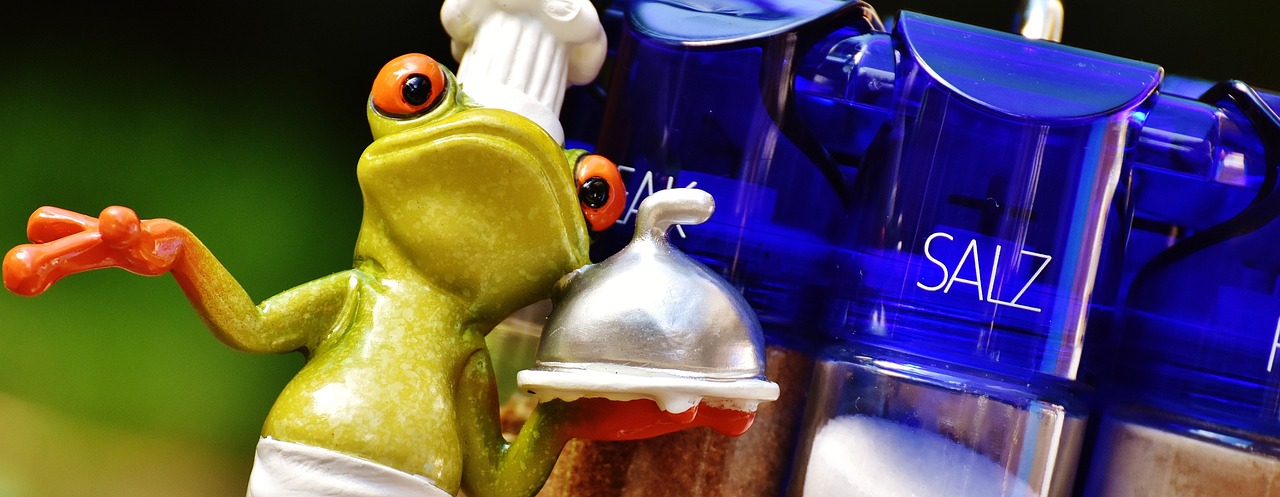
Planning Ahead for Special Meals
When it comes to ensuring your furry friend enjoys a special meal during celebrations, planning ahead is absolutely essential. Just like we prepare our own festive feasts, our pets deserve the same level of thoughtfulness and care. Imagine the joy on their faces when they see a plate filled with delicious, pet-friendly goodies! To make this happen, start by considering your pet's dietary restrictions and preferences. This way, you can create a meal that not only tantalizes their taste buds but also keeps them healthy.
One of the first steps in planning ahead is to choose a theme for the meal that aligns with the occasion. Whether it’s a birthday, holiday, or just a fun gathering, you can incorporate elements that reflect the celebration. For instance, if it’s your pet’s birthday, consider making a dog-friendly cake or special treats that match the party's color scheme. A little creativity can go a long way in making your pet feel special!
Next, preparing ingredients in advance can save you a lot of time and stress on the day of the celebration. Consider creating a shopping list of ingredients you’ll need for your pet’s meal and treats. This can help you avoid last-minute grocery runs. Here’s a quick table to help you organize your ingredients:
| Ingredient | Purpose | Notes |
|---|---|---|
| Chicken or Turkey | Main protein source | Cooked, no bones |
| Carrots | Healthy vegetable | Chopped or pureed |
| Rice or Quinoa | Carbohydrate | Cooked plain |
| Peanut Butter | Treats | Ensure it’s xylitol-free |
As you plan, it’s also crucial to think about portions. While it might be tempting to spoil your pet with a feast, moderation is key. You wouldn’t want to see them feeling uncomfortable after indulging too much. A good rule of thumb is to keep their regular meal portions in mind and adjust accordingly based on the special treats you’re introducing. This way, you can maintain their health while still allowing them to enjoy the festivities.
Lastly, don’t forget to set the mood for your pet’s special meal. Just as we enjoy a beautifully set table, your pet will appreciate a cozy dining area. You can use their favorite mat or dish, and even add a few decorations that are pet-friendly. This attention to detail not only enhances the dining experience but also shows your pet just how much they mean to you.
In summary, planning ahead for your pet's special meal involves a mix of creativity, organization, and love. By considering their dietary needs, preparing ingredients in advance, controlling portions, and setting a delightful atmosphere, you can create a memorable dining experience that your furry friend will cherish.
- What ingredients are safe for pets during special occasions? Always opt for lean meats, fruits, and vegetables that are known to be safe for your pet. Avoid ingredients like chocolate, onions, and grapes.
- How much should I feed my pet during celebrations? Stick to regular portion sizes, and remember that treats should only make up a small percentage of their overall diet.
- Can I give my pet human food? Yes, but only certain types that are safe for them. Always check for harmful ingredients before sharing.
- Should I consult my veterinarian before introducing new foods? Absolutely! Your vet can provide personalized advice based on your pet's health needs.
Special Occasion Meal Ideas
When it comes to making your pet feel special during celebrations, a thoughtfully prepared meal can work wonders. Just like us, our furry friends appreciate a delicious feast, especially when it’s served with love. So, why not whip up something extraordinary that not only tantalizes their taste buds but also aligns with their dietary needs? Here are some delightful meal ideas that can make any occasion memorable for your pet.
First up, consider a chicken and vegetable stew. This dish is not only hearty but also packed with nutrients. Simply simmer some boneless, skinless chicken breast with carrots, peas, and sweet potatoes until everything is tender. The aroma alone will have your pet wagging their tail in excitement! Remember to let it cool before serving, as we don’t want any burnt tongues in the celebration.
Another fantastic option is a salmon and quinoa bowl. Salmon is rich in omega-3 fatty acids, which are great for your pet's coat and skin. Cook some quinoa and mix it with flaked, cooked salmon, adding in some chopped spinach for an extra health boost. This meal is not only nutritious but also visually appealing, making it a feast for the eyes as well as the palate!
For a more festive touch, you can create a puppy-friendly cake. Yes, you read that right! Using ingredients like mashed bananas, peanut butter (make sure it’s xylitol-free), and whole wheat flour, you can bake a simple cake that your pet will adore. Decorate it with yogurt frosting made from plain Greek yogurt, and watch your furry friend dive into their very own cake with glee!
Don't forget about portion control. While it's tempting to indulge your pet with these delightful meals, moderation is key. A good rule of thumb is to keep treats to less than 10% of their daily caloric intake. If you’re unsure about how much to serve, consult with your veterinarian for tailored advice.
Incorporating these special meal ideas into your celebrations not only enhances your pet’s experience but also strengthens the bond you share. Remember, every meal is an opportunity to show your love and care, so get creative and make those special occasions truly unforgettable!
- Can I give my pet human food during special occasions? Yes, but make sure it's safe and appropriate for their dietary needs.
- What ingredients should I avoid when cooking for my pet? Avoid foods like chocolate, onions, garlic, grapes, and anything with xylitol.
- How can I ensure my pet doesn’t overeat during celebrations? Control portions and stick to a feeding schedule to avoid overindulgence.
- Is it okay to include my pet in family meals? Absolutely! Just ensure that the foods are safe for pets and don’t contain harmful ingredients.
Consulting Your Veterinarian
When it comes to your pet's health, is one of the most important steps you can take, especially during special occasions. Just like you wouldn't want to dive into a new recipe without checking if you have all the right ingredients, it's crucial to ensure that any new foods or treats you introduce to your pet are safe and appropriate for them. Your veterinarian knows your pet's medical history, dietary needs, and any potential allergies, making them the perfect resource for advice.
Imagine planning a big feast for a gathering and realizing halfway through that you forgot to check if someone has a food allergy. It can be a disaster! The same goes for your furry friends. By consulting your vet, you can avoid any unpleasant surprises that could arise from introducing new foods that may not sit well with your pet. They can guide you on what types of treats are suitable and how to adjust their regular diet during festive times without compromising their health.
Moreover, your vet can provide recommendations tailored specifically to your pet's breed, age, and health status. For instance, some pets may require special diets due to health conditions like diabetes or kidney issues. In such cases, your vet can help you create a customized meal plan that allows your pet to enjoy the festivities without risking their health.
Additionally, it's wise to discuss portion sizes for any new treats or meals. Your vet can help you understand how much is too much and what constitutes a safe serving size. After all, just because something is safe doesn't mean it should be served in excess. Overindulgence can lead to digestive issues or even more serious health problems.
In summary, never underestimate the value of a good consultation with your veterinarian. They are your partner in ensuring that your pet not only enjoys special occasions but does so in a way that keeps them healthy and happy. So, before you whip up those homemade treats or introduce a new meal, pick up the phone, and have a chat with your vet. Your pet will thank you for it!
- How often should I consult my veterinarian? It's a good idea to consult your veterinarian at least once a year for routine check-ups, but more frequent visits may be necessary if your pet has health concerns.
- Are all human foods safe for pets? No, many human foods can be harmful to pets. Always consult your veterinarian before introducing new foods.
- What should I do if my pet has an adverse reaction to a new treat? Contact your veterinarian immediately for guidance on how to proceed.
- Can I give my pet table scraps during special occasions? While it might be tempting, it's best to avoid giving table scraps without consulting your vet first.
Frequently Asked Questions
- What should I consider when feeding my pet during special occasions?
When feeding your pet during special occasions, it's essential to consider their unique dietary needs. Each pet has different nutritional requirements, so understanding what they can safely eat is crucial. Additionally, be mindful of portion sizes to prevent overindulgence, and choose treats that are safe and healthy for your furry friend.
- Are there any human foods that are safe for pets?
Yes, there are several human foods that can be safely offered to pets as treats. Foods like cooked chicken, carrots, and pumpkin can be great options. However, always avoid foods that are toxic to pets, such as chocolate, grapes, and onions. It's best to stick to treats specifically made for pets whenever possible.
- Can I make homemade treats for my pet?
Absolutely! Making homemade treats for your pet is a fantastic way to ensure they enjoy something special during celebrations. You can control the ingredients and tailor the treats to your pet's preferences. Simple recipes using safe ingredients can make your pet feel pampered while keeping their health in check.
- What ingredients should I avoid when making treats for my pet?
There are several common ingredients you should avoid when making treats for your pet. Foods like chocolate, avocados, and xylitol (a sweetener found in many sugar-free products) can be harmful. Always research any new ingredient and consult with your veterinarian if you're unsure about its safety.
- How can I include my pet in special occasions?
Including your pet in special occasions can be as simple as setting aside some time for bonding activities. You can prepare a special meal for them, involve them in family games, or even have a mini celebration just for them. The goal is to make them feel loved and part of the festivities!
- Should I consult my veterinarian before introducing new foods?
Yes, consulting your veterinarian before introducing new foods or treats is always a wise decision. They can provide valuable insights into what is safe and appropriate for your pet, ensuring that they enjoy special occasions without any health risks. It's better to be safe than sorry!
- How can I ensure portion control for my pet's treats?
To ensure portion control for your pet's treats, start by measuring out their usual food intake and then set aside a small portion for treats. A good rule of thumb is to keep treats to less than 10% of their daily caloric intake. This way, you can indulge them without compromising their health.


